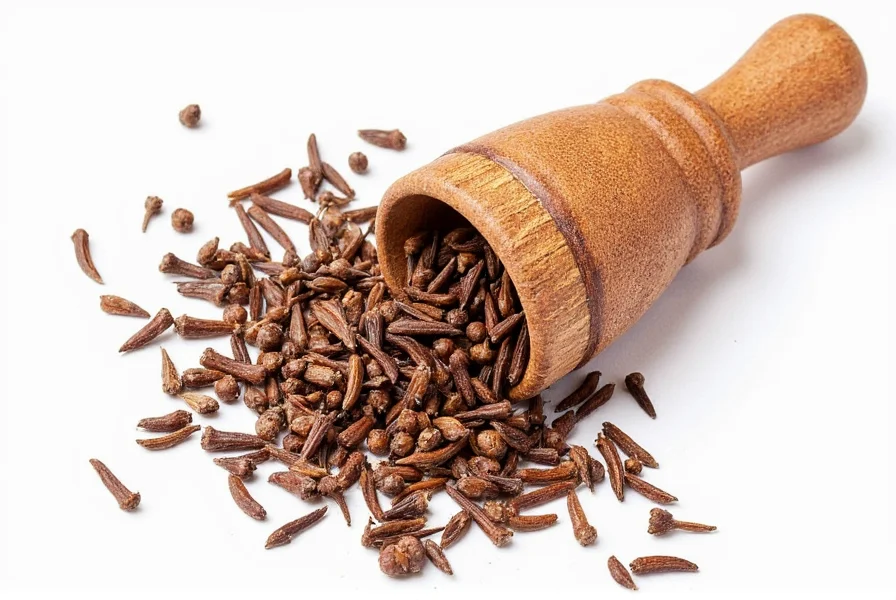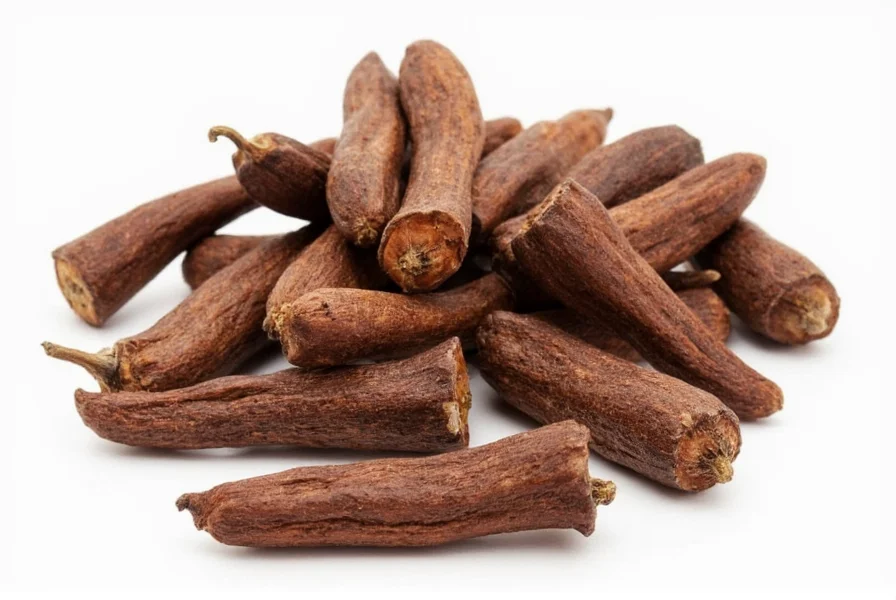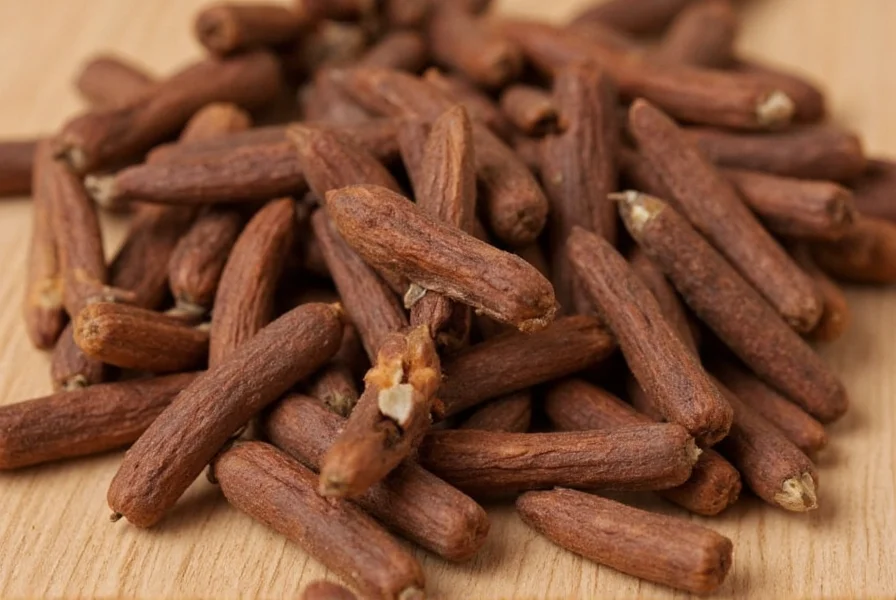Clove meaning refers to the aromatic dried flower buds of the Syzygium aromaticum tree, a valuable spice with deep cultural significance across civilizations. Beyond its culinary uses, cloves symbolize prosperity, protection, and healing in various traditions worldwide. The word \"clove\" derives from the Latin \"clavus,\" meaning \"nail,\" describing its nail-like shape.
Understanding clove meaning requires exploring both its botanical identity and symbolic significance. This versatile spice has shaped global trade routes, influenced cultural rituals, and provided medicinal benefits for centuries. Whether you're researching for culinary purposes, cultural understanding, or historical curiosity, cloves offer a rich tapestry of meaning that extends far beyond their distinctive flavor.
Botanical Definition and Origins
Cloves are the unopened flower buds of the evergreen clove tree (Syzygium aromaticum), native to the Maluku Islands in Indonesia. These small, nail-shaped buds measure approximately 1.5-2 cm long and feature a slender stem with a bulbous head. When harvested and dried, they transform from pale flowers to the familiar reddish-brown spice.
The scientific name Syzygium aromaticum reflects its aromatic properties that have made cloves valuable since ancient times. Unlike common misconceptions, cloves are not seeds but rather the immature flower structures of the tree. This botanical clarification addresses frequent confusion between \"clove\" and \"clover,\" which refers to an entirely different plant family.
| Characteristic | Description |
|---|---|
| Botanical Name | Syzygium aromaticum |
| Native Region | Maluku Islands, Indonesia |
| Primary Components | Eugenol (70-90%), caryophyllene, vanillin |
| Harvesting Season | May-August (when buds turn pink) |
Historical Journey of Cloves
The historical meaning of cloves reveals their extraordinary value in ancient economies. Arab traders initially controlled the clove trade, creating elaborate myths about their origins to protect their monopoly. By the 7th century, cloves reached China, where courtiers used them to freshen breath before addressing the emperor.
European demand for cloves fueled the Age of Exploration, with Portuguese and Dutch colonizers fighting for control of the Spice Islands. The Dutch once burned clove trees on conquered islands to maintain scarcity and drive up prices. This historical context explains why understanding clove meaning requires acknowledging both its cultural significance and turbulent economic history.

Cultural Symbolism Across Civilizations
The symbolic meaning of cloves varies dramatically across cultures. In Chinese tradition, cloves represent fidelity and remembrance, often included in wedding ceremonies. Ancient Egyptians used cloves in embalming rituals, believing they protected the deceased in the afterlife. Indian Ayurvedic practices associate cloves with purification and spiritual awakening.
In European folklore, cloves carried protective properties against evil spirits and illness. During the Middle Ages, people wore clove-studded oranges as natural air purifiers during plague outbreaks. This historical use connects to modern understanding of cloves' antimicrobial properties, demonstrating how traditional symbolic meanings often had practical foundations.
Culinary Significance and Applications
When exploring clove spice meaning in cooking, we discover its role as both flavor enhancer and preservative. The high eugenol content gives cloves their distinctive warm, slightly sweet, and pungent flavor profile. Chefs use whole cloves for slow-cooked dishes like mulled wine and pot roast, while ground cloves feature prominently in spice blends from garam masala to pumpkin pie spice.
Understanding proper usage is essential—cloves overpower other flavors when used excessively. The optimal ratio is typically one whole clove per serving or 1/4 teaspoon ground cloves per recipe. This precision reflects why culinary professionals consider cloves a \"foundational spice\" rather than a background flavor.
Medicinal Properties and Traditional Healing
The therapeutic meaning of cloves spans millennia of traditional medicine. Ancient Ayurvedic texts document cloves for dental care, digestive issues, and respiratory conditions. Modern research validates many traditional uses, confirming cloves' antimicrobial, anti-inflammatory, and analgesic properties.
Dentists still use eugenol, the primary compound in cloves, as a temporary filling material and pain reliever. Studies show clove oil effectively reduces toothache pain, explaining its enduring presence in natural dental care. However, proper dilution is crucial, as undiluted clove oil can damage oral tissues—a reminder that traditional remedies require informed application.
Common Misconceptions Clarified
Many searchers confuse \"clove meaning\" with \"clover meaning,\" leading to inaccurate information. Cloves (Syzygium aromaticum) are spice buds from an evergreen tree, while clover refers to Trifolium plants with three-leaf clusters. This distinction matters for both culinary applications and symbolic interpretations.
Another frequent misunderstanding involves clove cigarettes (kreteks). Despite their name, these products contain tobacco and pose similar health risks to conventional cigarettes. This clarification addresses a common search pattern where users seek \"clove meaning\" but actually want information about clove-flavored tobacco products.

Modern Cultural Significance
Today, clove meaning continues evolving in contemporary contexts. In aromatherapy, clove essential oil represents mental clarity and focus. Sustainable farming initiatives in Indonesia and Madagascar preserve traditional cultivation methods while ensuring fair labor practices. The spice's resurgence in craft cocktails and artisanal baking demonstrates how historical ingredients find new relevance.
Understanding what does clove symbolize in modern wellness culture reveals connections between ancient wisdom and contemporary health trends. From natural oral care products to holistic healing practices, cloves maintain their symbolic association with protection and vitality—proving that some meanings withstand the test of time.
Frequently Asked Questions
What is the literal meaning of the word 'clove'?
The word 'clove' comes from the Latin 'clavus,' meaning 'nail,' which describes the spice's nail-like shape. This botanical term specifically refers to the dried flower buds of the Syzygium aromaticum tree, not to be confused with 'clover,' which is a completely different plant.
What do cloves symbolize in different cultures?
Cloves carry diverse symbolic meanings across cultures: in Chinese tradition they represent fidelity, in Egyptian practices they symbolized protection in the afterlife, and in European folklore they were believed to ward off evil spirits. Many cultures associate cloves with prosperity, healing, and spiritual purification.
How are cloves different from clover?
Cloves and clover are completely different: cloves are the dried flower buds of an evergreen tree (Syzygium aromaticum) used as a spice, while clover refers to plants in the Trifolium genus with three-leaf clusters. The confusion stems from similar pronunciation but they have no botanical relationship.
What are the primary historical uses of cloves?
Historically, cloves served as valuable trade commodities, medicinal remedies, and ceremonial elements. Ancient Egyptians used them in embalming, Chinese courtiers chewed them for fresh breath, and European apothecaries prescribed them for dental pain and digestive issues. Their high value once fueled global exploration and colonial conflicts.
Can cloves have health benefits beyond culinary uses?
Yes, cloves contain eugenol which has documented antimicrobial, anti-inflammatory, and analgesic properties. Research supports their traditional use for dental pain relief, though proper dilution is essential. Cloves also show potential antioxidant benefits, but should complement rather than replace conventional medical treatments.











 浙公网安备
33010002000092号
浙公网安备
33010002000092号 浙B2-20120091-4
浙B2-20120091-4